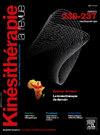老年人的痛苦是护理的障碍吗?
Q4 Medicine
引用次数: 0
摘要
物理治疗师经常面临反映老年患者可能经历的痛苦的抱怨。他们可能会发现自己缺乏资源和知识来帮助病人,并为他们提供道义上的支持。因此,痛苦仍然是一个经常被误解的概念。痛苦是病人难以忍受的经历。事实上,病人可能不再觉得自己的存在有意义:他在自己的行动能力中不再认识自己,他的关系被身体和精神上的禁锢所吞噬。哲学家保罗·里科(Paul Ricoeur)提出,痛苦是对我们与自己和他者关系的改变。痛苦反映了行动能力的改变,涉及四个层面:语言、叙事、行动和道德责任。正是在患者与治疗师的关系以及物理治疗的可能性中,这种方法变得具体起来。根据Paul Ricoeur的哲学,将痛苦与护理结合起来,成为护理者的一种观点。考虑痛苦是至关重要的,这种考虑通过语言表达出来,并在治疗师和患者之间的交流中得到表达。对护理人员来说,理解痛苦的概念,给予它应有的位置和价值,从而将衰老视为一个机会的领域,是有益的。护理成为两个主体之间的关系,在这种关系中,人们可以说、做、讲、讲自己,并将自己视为一个行动的存在。受苦的人可以从受苦的被动中走出来,成为自己人生道路上的一员。理疗师经常面临反映老年患者痛苦的抱怨。他们可能会发现自己处于失败的境地,因为缺乏资源和知识,使他们能够为病人提供救济和道义支持。痛苦是一个经常被误解的概念。痛苦是病人难以忍受的经历。病人可能不再在他们的存在中找到任何意义:他们不再认识到自己的行动能力,他们的关系被身体和心理的限制所破坏。哲学家保罗·里科尔(Paul Ricoeur)认为,苦难应该被视为自我与他人关系的改变。苦难反映了行动力量的改变,涉及四个层面:言语、叙述、行动和道德责任。正是在患者-治疗师关系和物理治疗护理中行动的可能性中,这种方法变得具体。根据保罗·里科尔的哲学,将痛苦整合到护理中,成为护理者的一种视角。考虑痛苦是至关重要的,这种考虑是通过治疗师和患者之间的语言和交流来表达的。对护理人员来说,理解痛苦的概念,并给予它应有的位置和价值,引导他们把衰老看作是一个可能的领域,这是卓有成效的。关怀成为两个主体之间的关系,在这种关系中,人们可以说、做、说、告诉自己,并将自己视为积极的存在。患者可以从一种顺从的被动状态中出现,成为自己生活中的积极参与者。本文章由计算机程序翻译,如有差异,请以英文原文为准。
La souffrance de la personne âgée : une entrave au soin ?
Le kinésithérapeute est souvent confronté à des plaintes qui traduisent la souffrance que peuvent éprouver les patients âgés. Il peut se retrouver démuni en raison d’un manque de moyens et de connaissances qui lui permettraient de soulager et d’accompagner moralement le patient. La souffrance reste alors une notion souvent incomprise. La souffrance consiste en une expérience difficile à supporter par le patient. En effet, le patient peut ne plus trouver de sens à son existence : il ne se reconnaît plus dans ses possibilités d’agir et ses relations sont taries par un enfermement physique et psychique. Le philosophe Paul Ricoeur propose de considérer la souffrance comme une altération du rapport à soi et du rapport à l’Autre. La souffrance traduit une altération de la puissance d’agir et concerne quatre niveaux : la parole, la narration, l’action et l’imputabilité morale. C’est dans la relation patient-thérapeute et les possibilités d’action du soin kinésithérapique que cette approche devient concrète. Intégrer la souffrance au soin, à la lumière de la philosophie de Paul Ricoeur, devient une perspective pour le soignant. Il est déterminant de considérer la souffrance, considération qui passe par la parole et se traduit par des échanges entre le thérapeute et le patient. Il s’avère fructueux pour le soignant de comprendre l’idée de souffrance, de lui accorder la place et la valeur qu’elle mérite, conduisant à regarder le vieillissement comme un champ de possibilités. Le soin devient une relation entre deux sujets, dans laquelle il est permis de dire, de faire, de raconter, de se raconter et de s’estimer soi-même en tant qu’être agissant. Le sujet souffrant peut sortir d’une passivité subie pour devenir acteur de son propre parcours de vie.
Physiotherapists are often faced with complaints that reflect the suffering of elderly patients. They may find themselves at a loss because of a lack of resources and knowledge that would enable them to provide relief and moral support to the patient. Suffering is a concept that is often misunderstood. Suffering is an experience that is difficult for the patient to bear. Patients may no longer find any meaning in their existence: they no longer recognise their ability to act, and their relationships are dried up by physical and psychological confinement. The philosopher Paul Ricoeur suggests that suffering should be seen as an alteration in the relationship between oneself and the Other. Suffering reflects an alteration in the power to act and concerns four levels: word, narration, action and moral accountability. It is in the patient-therapist relationship and the possibilities for action in physiotherapy care that this approach becomes concrete. Integrating suffering into care, in the light of Paul Ricoeur's philosophy, becomes a perspective for the carer. It is crucial to consider suffering, and this consideration is expressed through words and exchanges between the therapist and the patient. It is fruitful for carers to understand the idea of suffering, and to give it the place and value it deserves, leading them to look at ageing as a field of possibilities. Care becomes a relationship between two subjects, in which it is possible to say, do, tell, tell oneself and value oneself as an active being. The sufferer can emerge from a state of submissive passivity to become active player in his or her own life.
求助全文
通过发布文献求助,成功后即可免费获取论文全文。
去求助
来源期刊

Kinesitherapie
Medicine-Rehabilitation
CiteScore
0.40
自引率
0.00%
发文量
135
期刊介绍:
Kinésithérapie, la revue adresse aux praticiens et aux étudiants qui veulent lire des informations accessibles et utiles. Ce est la première revue francophone paramédicale à être indexée dans une base de données internationale - Cumulative Index to Nursing and Allied Health Literature : CINAHL.
 求助内容:
求助内容: 应助结果提醒方式:
应助结果提醒方式:


